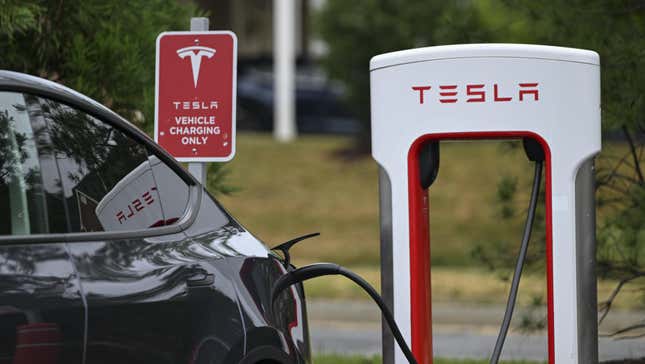
Tesla filed a lawsuit in federal court last week against startup EV charger adapter manufacturer EVject for false advertising, trademark dilution and unlawful trade practice. The electric automaker claims the adapter poses a “high safety risk,” and the product’s advertising centered around “working seamlessly” with DC fast charging has harmed Tesla’s brand.
If you own an electric vehicle and spend a bit too much time in “self-defense” Facebook groups, spending 15 minutes tethered to a fast charger might be an intensely anxious experience. Seeing an opportunity, EVject offers the Escape Connector, a charger adapter that allows EV drivers to pull away while their car is still connected to the charger. The adapter overrides the EV’s safeguard and allows the driver to shift into gear. The Escape Connecter will split in two to protect the charging port and cable during the getaway.
The EVject Escape Connector is supposed to provide peace of mind for $299 from carjackings, animal attacks and adverse weather conditions, but mainly carjackings. However, Tesla views the device differently. In its complaint, the automaker claims EVject falsely markets its project as safe and that there’s “no over-temperature protection design nor devices in the Connector’s construction.” The document filed in US District Court for the Northern District of California reads:
In the event of an over-temperature condition in the Connector, the lack of overtemperature protection creates a safety risk. Testing of high-current simulated charging through the Connector, utilized in conjunction with a Tesla Supercharger cable and Tesla EV charge port, demonstrated that surface temperatures of the Connector may reach as high as 100C, after 30 minutes of charging at 420 ADC. During an over-temperature event, a user of the Connector may be burned during (or following) charging by touching or grabbing the Connector. Additionally, the high temperature present in the Connector poses a risk of fire and ignition of other combustible materials in the charger cable, the vehicle connected to the Connector, and the Supercharger infrastructure.
If the EVject Escape Connector is reaching 212 degrees while charging, it might actually be more dangerous than having your car stolen. Tesla is requesting the court prevent EVject from advertising its product as safe, ban the adapter import into the United States and require the company to pay no less than $75,000 in damages.
The precise amount awarded in damages would be determined during the trial. However, I’m certain that Tesla is familiar with how much damage that design problems can do to its brand. The automaker has enough recall experience with the Cybertruck in less than a year than I’ll have in my entire lifetime.

